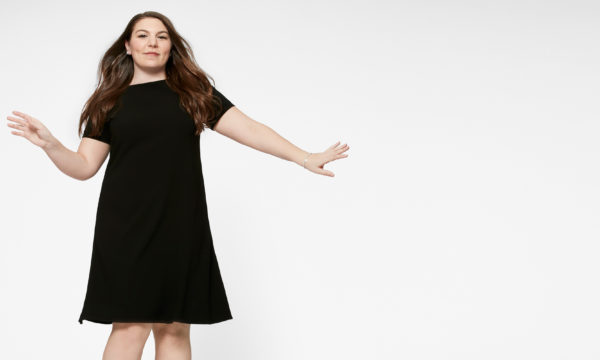
Shop This Look
6 Women on Finding Out They Make Less Than Their Male Coworkers
They were shocked and angry—and then they took action.
It’s 2020. Women are starting their own companies and running board meetings; working from home as they raise their children; graduating from medical school; running for office; and becoming high-powered CEOs. And yet, despite this progress, they’re still making less than their male counterparts.
The gender pay gap is indisputable. In 2019, the Bureau of Labor and Statistics revealed that women as a whole earn just 81% of what their male coworkers make, and the gap is worse for black women and other women of color. Similarly, working mothers are paid less than working fathers—just 80 cents for every dollar dads make—and a 2019 study by Bright Horizons, a U.S. child care provider, found that 41% of Americans assume moms are less dedicated to their work than non-moms.
Still, many people try to explain away the very real pay disparities between working men and women, or worse, don’t even know about it. A 2018 survey found that one in three Americans simply do not know that the gender wage gap even exists.
But it does, and the first step toward eradicating a problem is acknowledging that it is, in fact, real. Below, 6 women detail the moment they realized they were getting paid less than a male counterpart who was equally or less qualified than they were in their respective positions, how that information made them feel, and in some cases, what they did to rectify the situation.

Nicole Russin-McFarland, 32
Throughout my career, I have found out that, as a freelancer, I was paid less money than men doing the same job. In every situation, I learned about the disparity because I spoke to male freelancers for the same publications, some of whom were less experienced than I was. I have also had issues with publications trying not to pay me, although they paid the men on time. The men told me it was sexism.
In each circumstance, I confronted the editors for not paying me and heard every excuse, including one magazine telling me that because the check was ‘lost in the mail,’ they had to deduct a FedEx fee from my paycheck to confirm it would get there. They did—an exaggerated amount that was more than FedEx said it would be.
A few times, I have also confronted editors about the pay difference between me and less experienced male freelance journalists. The editors, often female, said the difference was excusable because of the ‘content’ provided—but we provided similar content. The editors were forced to pay me, but they also fired me, so I quit complaining. If you complain, you’re given ‘go away’ money.”
Want more M Dash?
Sign up for our weekly newsletter.
Thank you!
Isabelle, 22
I will never forget the evening I found out. I had spent a very long day on set. I was tired and wondered when I could leave, and a male colleague of mine joked that I still needed to hang around and wait for my last scene to be shot so that I could make the same amount of money as the boy in the cast by working more hours than he did.
He used the words ‘gender pay gap,’ and I recall having heard that term before, but I had never really connected it to anything relevant.
I remember my young head truly being unable to wrap itself around the fact that I might be—and had been—receiving less money than boys my age. I also started to worry for the women in my family and wonder about their finances. This concept just did not make sense to me, and I had a hard time believing it was true! It was the first time as an actress that I ever thought about my pay in a competitive way. I was never in it for the money, but I certainly was not in it to be worth less than others. Thinking back, I believe that was the moment from which I was interested in my exact pay and how acting deals would work. I have also worked in a job that prided itself on paying equally…and I found it a little bit embarrassing that this was something they had to be proud of and advertised themselves with.
I have heard men complain about theaters and productions that pay equally or hire 50:50. They don’t think it’s fair to hire a woman over a man ‘just because she is a woman.’ They wouldn’t think that perhaps the woman was hired because she is just as—or even more—qualified. I find it nothing less than embarrassing and shameful on their part.”

Meredith, 28
I had a ton of internship experience and a little bit of full-time job experience under my belt. I decided not to accept the offer, as I had a better offer on the table, so I referred a friend. He had no relevant experience, but was a good guy and a hard worker. He was offered $35,000. I was offered $28,000.
I was fresh out of college, so I wasn’t entirely sure what to do. Now, I share my salary with my coworkers. Specifically, I had a coworker at a large corporate headquarters who wasn’t making what I was in the same role; he was a minority with an MBA. I had learned to negotiate prior to accepting the job this time, and he hadn’t. I helped him fight for a raise and a promotion.”
Samantha, 31
I was super sad when I learned my offer was that much lower. I experienced some self-pity for a second, then rolled up my sleeves and got to work researching the best way to negotiate. It felt too immature to just say, ‘Well, you’re paying him X…,’ so I had to make my case based on my merit. The extra frustrating part was that my internship projects had been better received and my GPA was higher.
In the end, I only recouped half the amount of the gap. It still felt wrong, but again, I didn’t feel like I could just point my finger at my peer.”

Leah, 30
I was actually starting to research what the industry standard title for my job description is, and it just so happened that around this time, the media salary spreadsheet was released. In it, people listed their gender identity, experience, title, job description, and salary. I saw that there was someone on the list who worked at my company and was listed as a digital editor—not a senior digital editor—and was making 25% more than I was. This person identified as male. Not only did he have a lower-level title than I did, he had less experience than I did.
When I found out, I was shocked, I was angry at the company, and I was angry at myself for not advocating for more money when I started. Furthermore, I was insulted. It was a mix of emotions. I mean, I threw my phone. I always knew the gender pay gap was real, but to see it personally—and to see such an extreme difference—was mind-blowing to me.”
Amy, 34
I went to my line manager. I had the same work experience, more responsibility in my role, and was leading more value from a lead conversion perspective. I was immediately told that discussing salary was a gross misconduct and that any more [discussion] would lead to disciplinary action. I then sought advice from a family member who is an HR Director and went to the managing director with a written complaint. They eventually raised my salary to match his, but I was placed in a new role—all very clever. The other guy was eventually fired because he wasn’t good at his job.”








